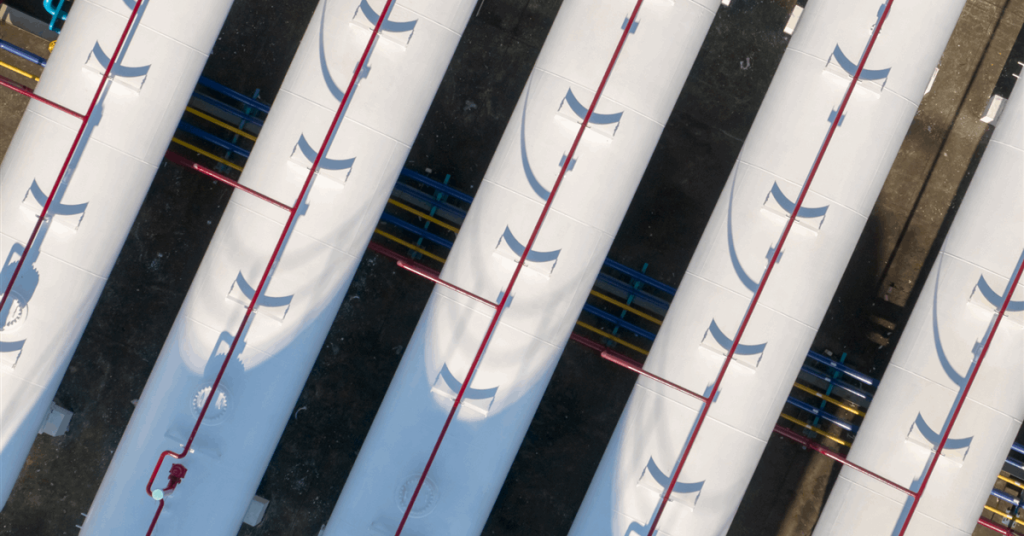ORLEN SA has agreed to deliver an additional 140 million cubic meters (4.94 billion cubic feet) of liquefied natural gas (LNG) from the United States to Ukraine’s Naftogaz Group via Poland.
This is the fourth LNG supply contract signed by the state-owned companies this year, bringing Naftogaz’s total contracted gas volumes from ORLEN to 440 million cubic meters, Naftogaz said in an online statement.
The contracts are part of a cooperation pact signed by ORLEN and Naftogaz last March to diversify Ukraine’s gas supply sources, ORLEN said separately.
After arriving from the U.S., the LNG is planned to be regasified at the Swinoujscie terminal in Poland or the Klaipeda terminal in Lithuania and then transported to Ukraine via Poland.
“Naftogaz is diversifying its sources and routes of gas supply”, said Naftogaz chief executive Sergii Koretskyi. “This enhances Ukraine’s energy security and resilience amid the ongoing full-scale war with Russia”.
“Signing an additional contract for the supply of American LNG is an important element of our preparations for the coming winter heating season and a big step toward ensuring reliable gas supply for Ukrainians”, Koretskyi added.
ORLEN chief operating officer Robert Soszynski said, “Thanks to our continually developed trading expertise, proprietary fleet of LNG transport vessels and reserved regasification capacities, we are well-positioned to support Ukraine in diversifying both the sources and supply routes for natural gas”.
“The summer period, which is crucial for replenishing storage facilities, adds to the importance of these deliveries”, Soszynski added.
“ORLEN not only ceased all Russian gas imports over three years ago, but today we are also in a position to assist neighboring countries, such as Slovakia and Ukraine, on their path toward energy independence from Russia”, Soszynski said.
On Monday ORLEN said it had also eliminated Russian oil from its supply chain when the final contract for deliveries of Russian crude meant for Czechia expired this month.
“I’m pleased that Naftogaz has recognized the competitiveness of our offer”, Soszynski said. “It provides a strong foundation for deepening our cooperation, to the benefit of both parties and the broader energy security of the region”.
In June ORLEN said it had signed another energy collaboration agreement with Naftogaz.
Under the new memorandum of understanding, “the parties will seek to increase natural gas deliveries via Poland to Ukraine and to advance joint projects in oil and gas extraction”, ORLEN said. “These initiatives are expected to strengthen Ukraine’s resource security and flexibility.
“Naftogaz also stands to benefit from ORLEN’s technical expertise in the modernization of the Kremenchuk oil refinery, as well as in the refurbishment of gas infrastructure damaged during the war.
“In addition, both companies intend to pursue joint investment projects across fuel distribution and development of the biofuels segment”.
ORLEN says it also continues to supply Ukraine with fuels from its refineries in Poland and Lithuania, as it has done so since 2007.
To contact the author, email jov.onsat@rigzone.com
What do you think? We’d love to hear from you, join the conversation on the
Rigzone Energy Network.
The Rigzone Energy Network is a new social experience created for you and all energy professionals to Speak Up about our industry, share knowledge, connect with peers and industry insiders and engage in a professional community that will empower your career in energy.
element
var scriptTag = document.createElement(‘script’);
scriptTag.src = url;
scriptTag.async = true;
scriptTag.onload = implementationCode;
scriptTag.onreadystatechange = implementationCode;
location.appendChild(scriptTag);
};
var div = document.getElementById(‘rigzonelogo’);
div.innerHTML += ” +
‘‘ +
”;
var initJobSearch = function () {
//console.log(“call back”);
}
var addMetaPixel = function () {
if (-1 > -1 || -1 > -1) {
/*Meta Pixel Code*/
!function(f,b,e,v,n,t,s)
{if(f.fbq)return;n=f.fbq=function(){n.callMethod?
n.callMethod.apply(n,arguments):n.queue.push(arguments)};
if(!f._fbq)f._fbq=n;n.push=n;n.loaded=!0;n.version=’2.0′;
n.queue=[];t=b.createElement(e);t.async=!0;
t.src=v;s=b.getElementsByTagName(e)[0];
s.parentNode.insertBefore(t,s)}(window, document,’script’,
‘https://connect.facebook.net/en_US/fbevents.js’);
fbq(‘init’, ‘1517407191885185’);
fbq(‘track’, ‘PageView’);
/*End Meta Pixel Code*/
} else if (0 > -1 && 72 > -1)
{
/*Meta Pixel Code*/
!function(f,b,e,v,n,t,s)
{if(f.fbq)return;n=f.fbq=function(){n.callMethod?
n.callMethod.apply(n,arguments):n.queue.push(arguments)};
if(!f._fbq)f._fbq=n;n.push=n;n.loaded=!0;n.version=’2.0′;
n.queue=[];t=b.createElement(e);t.async=!0;
t.src=v;s=b.getElementsByTagName(e)[0];
s.parentNode.insertBefore(t,s)}(window, document,’script’,
‘https://connect.facebook.net/en_US/fbevents.js’);
fbq(‘init’, ‘1517407191885185’);
fbq(‘track’, ‘PageView’);
/*End Meta Pixel Code*/
}
}
// function gtmFunctionForLayout()
// {
//loadJS(“https://www.googletagmanager.com/gtag/js?id=G-K6ZDLWV6VX”, initJobSearch, document.body);
//}
// window.onload = (e => {
// setTimeout(
// function () {
// document.addEventListener(“DOMContentLoaded”, function () {
// // Select all anchor elements with class ‘ui-tabs-anchor’
// const anchors = document.querySelectorAll(‘a .ui-tabs-anchor’);
// // Loop through each anchor and remove the role attribute if it is set to “presentation”
// anchors.forEach(anchor => {
// if (anchor.getAttribute(‘role’) === ‘presentation’) {
// anchor.removeAttribute(‘role’);
// }
// });
// });
// }
// , 200);
//});

